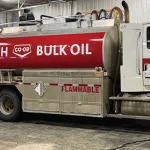
Funding for short line rail infrastructure to increase
Short lines are a safe and efficient way to move bulk commodities, which reduces wear and tear on Saskatchewan highways.
The provincial government is allocating $1 million from the Ministry of Highways’ Short Line Railway Improvement Program (SRIP) for infrastructure like track upgrades and expansion, improved crossing surfaces and sightlines, bridge maintenance, and track rehabilitations. This is an increase of $470,000 from last year’s budget.
Thirteen provincially regulated short line railways operate on 2,123 kilometres of track in Saskatchewan.
Andrew Glastetter, the President of the Western Canadian Short Line Railway Association, said rising material costs over the last three years means that it is now more expensive per mile for railways to maintain tracks to meet and exceed the safety and performance standards required.


